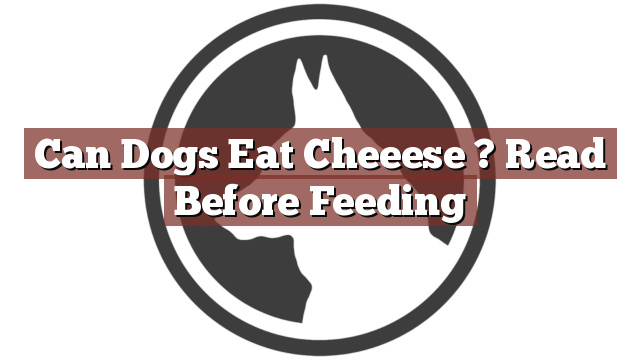Understanding Your Dog’s Dietary Needs
As a responsible pet owner, it is essential to understand your dog’s dietary needs. Dogs, like humans, require a balanced diet to maintain their overall health and well-being. While it may be tempting to share your favorite foods with your furry friend, it is crucial to assess whether certain foods are safe and appropriate for them. One common question that arises is, "Can dogs eat cheese?"
Can Dogs Eat Cheese? Read Before Feeding
Can dogs eat cheese? The answer is yes, but with caution. Cheese can be a tasty treat for dogs, but it is important to consider a few factors before feeding it to your furry companion. While cheese is not toxic to dogs, some canines may have difficulty digesting dairy products due to lactose intolerance. Lactose intolerance occurs when dogs lack the enzyme necessary to break down lactose, the sugar found in milk products. Feeding cheese to a lactose-intolerant dog can result in gastrointestinal issues such as diarrhea, gas, or an upset stomach.
Pros and Cons of Feeding Cheese to Dogs
There are pros and cons to feeding cheese to dogs. On the positive side, cheese can be a good source of protein, calcium, and vitamins for your canine friend. It can also serve as an excellent training treat or a way to administer medication by hiding it inside a small cheese cube. Additionally, some dogs thoroughly enjoy the taste of cheese, making it a valuable tool for positive reinforcement during training sessions.
However, it is crucial to consider the potential drawbacks as well. Apart from the possibility of lactose intolerance, cheese is high in fat and calories. Feeding excessive amounts of cheese to your dog can contribute to weight gain and obesity, leading to various health problems. It is also worth noting that certain types of cheese, such as blue cheese or those with added flavorings like garlic or onions, can be harmful or toxic to dogs. Therefore, it is essential to consult with your veterinarian before introducing cheese into your dog’s diet.
Conclusion: Making Informed Choices for Your Canine Companion
In conclusion, while dogs can eat cheese, it is important to proceed with caution. Before feeding cheese to your dog, consider their individual dietary needs, any potential lactose intolerance, and the specific type of cheese being offered. Moderation is key, as excessive consumption can lead to weight gain and other health issues. As always, it is recommended to consult with your veterinarian to determine what is best for your furry companion. By making informed choices, you can ensure that your dog’s diet remains balanced and tailored to their specific needs.
Thank you for taking the time to read through our exploration of [page_title]. As every dog lover knows, our furry friends have unique dietary needs and responses, often varying from one canine to another. This is why it's paramount to approach any changes in their diet with caution and knowledge.
Before introducing any new treats or making alterations to your dog's diet based on our insights, it's crucial to consult with a veterinarian about [page_title]. Their expertise ensures that the choices you make are well-suited to your particular pet's health and well-being.
Even seemingly harmless foods can sometimes lead to allergic reactions or digestive issues, which is why monitoring your dog after introducing any new food item is essential.
The content provided here on [page_title] is crafted with care, thorough research, and a genuine love for dogs. Nevertheless, it serves as a general guideline and should not be considered a substitute for professional veterinary advice.
Always prioritize the expert insights of your veterinarian, and remember that the health and happiness of your furry companion come first.
May your journey with your pet continue to be filled with joy, love, and safe culinary adventures. Happy reading, and even happier snacking for your canine friend!

